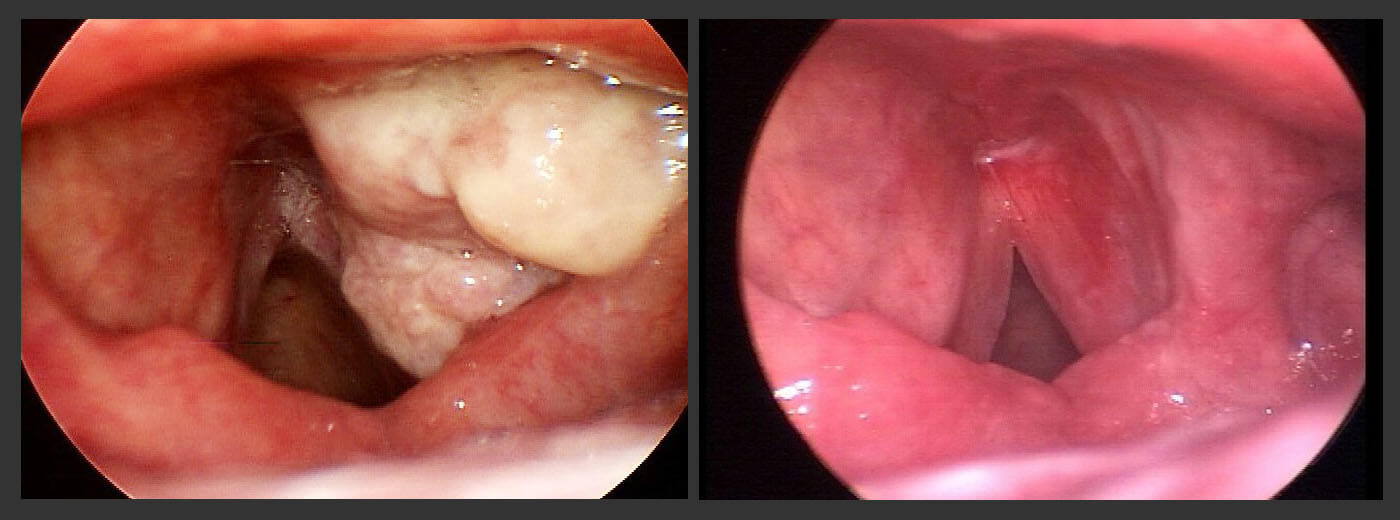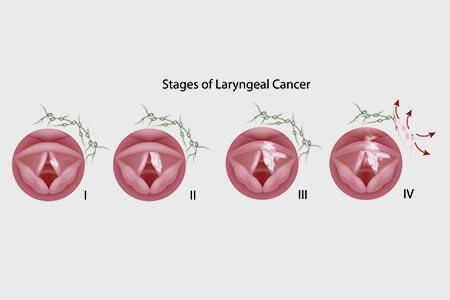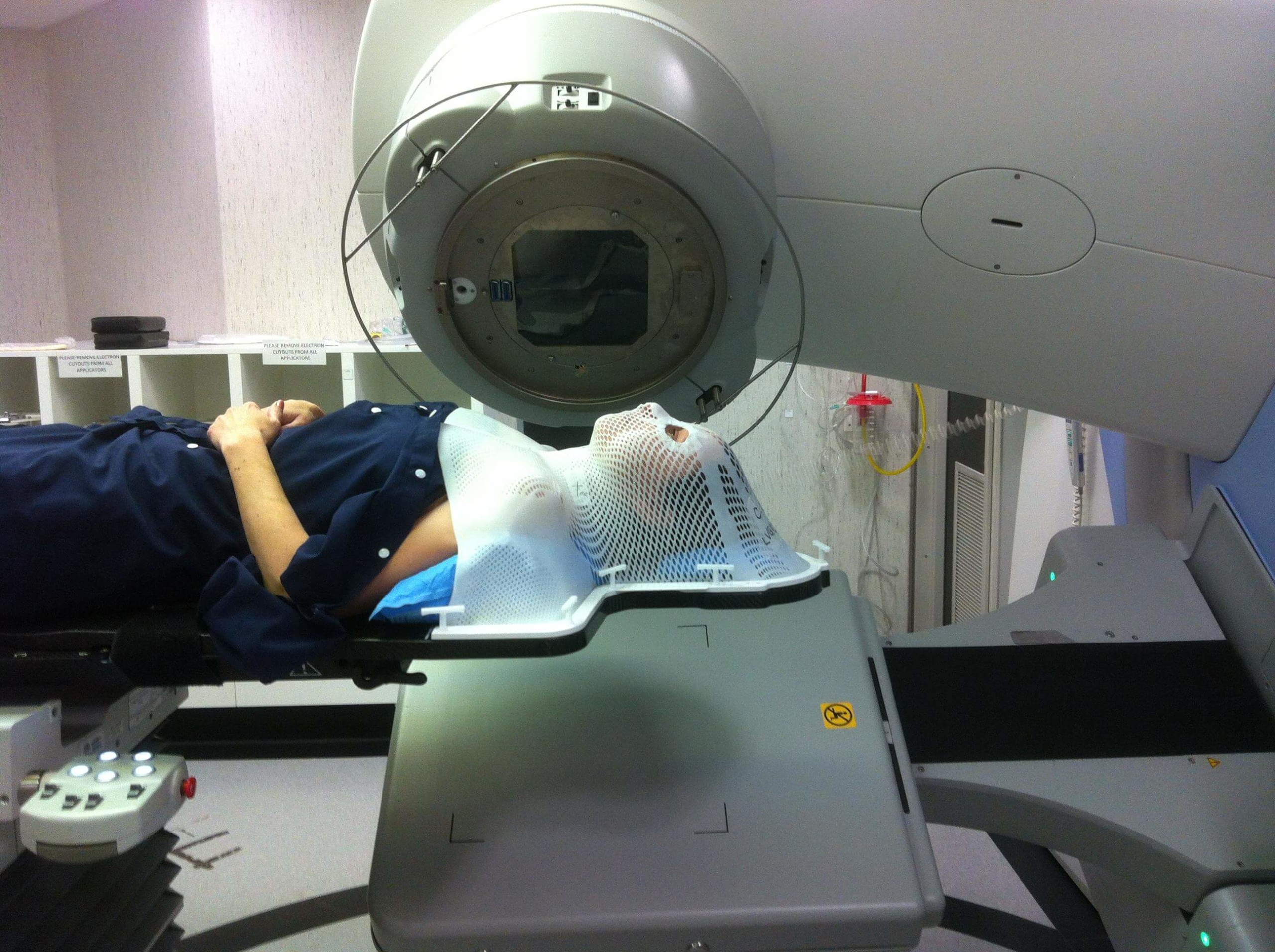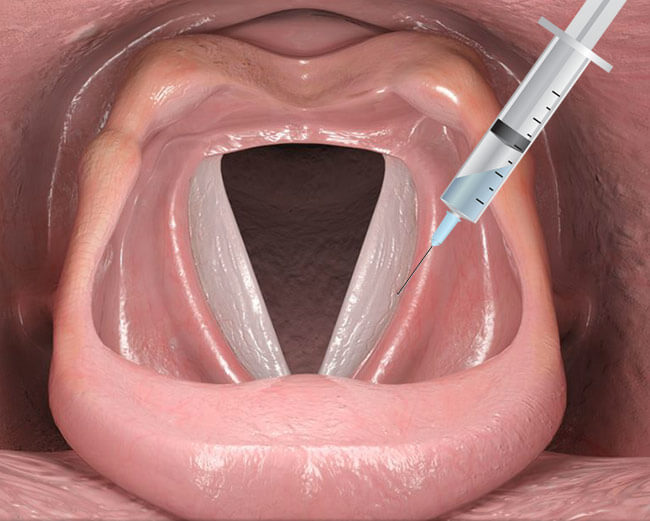Calls for Ukraine
Calls for Europe
Calls for USA

Laryngeal cancer is the most common type of malignant tumor of the head and neck. Much more common in men (ratio to women 17:1). The danger of this disease is that it is difficult to recognize at an early stage. However, there are specific symptoms that should be a warning sign for the patient. We will talk about them, as well as what modern methods of diagnosing and treating laryngeal cancer exist, in this article.
Tobacco smoking is considered the most important etiological factor contributing to the development of malignant tumors of the larynx. This type of cancer is very rare in non-smokers. Other factors that increase the risk of developing the disease include:
Genetic predisposition also increases the likelihood of developing laryngeal tumors.

Voice disturbance is the first sign of the development of a malignant process, which should definitely be paid attention to. Initially, this is a change in timbre, weakness, lack of sonority, fatigue and periodic hoarseness of varying intensity, which intensifies after prolonged tension of the vocal cords.
As the tumor develops, other symptoms may appear that indicate throat cancer, such as:
Symptoms of supraglottic cancer
Tumors localized in the upper part of the larynx have a hidden and atypical course. They usually cause long-lasting symptoms and complaints, suggesting the presence of chronic inflammation of the throat. At the initial stage of the disease, patients complain of discomfort associated with a feeling of a lump in the throat, dryness, soreness and irritation. As the tumor increases in size, dysphagia (difficulty swallowing), hemoptysis, mucosal ulceration, and bad breath occur.
Symptoms of subglottic cancer
The first sign of this type of cancer may be a slight change in voice quality caused by progressive immobilization of the cricoarytenoid joint. In some cases, the tumor develops asymptomatically for a long time, slowly increasing in volume and causing a gradual narrowing of the airways. In the later stages, shortness of breath appears, first with exertion, and then at rest. When the tumor disintegrates, the symptom of hemoptysis is observed.

Doctors classify laryngeal tumors depending on their location:
The most common histological form of laryngeal tumors is squamous cell carcinoma (95%). Glandular cancer and basal cell carcinoma are much less common.

Laryngeal cancer, as a rule, does not have characteristic visual signs that can be detected during self-examination. However, there are some manifestations that may indicate the presence of the disease.
The manifestations described above refer to the late stage of laryngeal cancer. The first warning signs include: change in voice, pain when swallowing, feeling of a lump in the throat.
Sore throat with laryngeal cancer can manifest itself in different ways, depending on the stage of the disease, its location and other factors. Pain is insignificant or absent in the initial stages of laryngeal cancer, when the tumor does not exert significant pressure on surrounding tissues.
As the tumor grows, pain appears. Patients may complain of:
Any pain in the throat that does not go away for a long time is a reason to consult a doctor. Leave a request on this page to get a free consultation with a MedTour coordinating doctor. A medical coordinator will help you select a clinic and a doctor to diagnose laryngeal diseases.
Throat cancer is not a clearly defined medical term. It describes two types of malignant tumors: cancer of the pharynx and cancer of the larynx. But sometimes these names are used as synonyms. In this article, we use the term throat cancer solely for the convenience of users.

Staging of malignant throat tumors is based on their location, spread to lymph nodes and metastasis to other organs. This is an important stage in the diagnostic process, since the choice of therapeutic tactics depends on determining the stage of the tumor.
The tumor is in the superficial cell layer of the larynx and has not spread to the lymph nodes or other areas of the body.
| Localization area of the malignant process | Tumor characteristics | Spread to lymph nodes | Distant metastases |
| Supraglottic region | The tumor does not affect the vocal cords. | No | No |
| Glottis | The tumor is localized in the area of the vocal cords, but does not limit their function. | No | No |
| Subglottic region | The tumor is limited to the subglottic region. | No | No |
| Localization area of the malignant process | Tumor characteristics | Spread to lymph nodes | Distant metastases |
| Supraglottic region | The tumor is located in more than one part of the epiglottis or is located outside of it near the base of the tongue or the wall of the sinus. | No | No |
| Glottis | The neoplasm is localized in the glottis and has grown to the supraglottic and/or subglottic region. There may be a dysfunction of the vocal apparatus. | No | No |
| Subglottic region | The tumor is localized in the subglottic region and has spread to the vocal cords. Ligament function may be impaired. | No | No |
The tumor is located in any part of the larynx. The function of the vocal cords is impaired. The tumor may affect other areas of the larynx or thyroid cartilage. The malignant process has spread to one or more lymph nodes on the side of the tumor location.
The tumor is localized in any part of the larynx. The malignant process has spread to the trachea, tongue, thyroid gland or esophagus. In some cases, the carotid artery or other organs of the chest are affected. Cancer cells are present in the lymph nodes. At a late stage, there are distant metastases.

A diagnostic examination for suspected throat cancer includes the following steps:
Innovative methods for diagnosing cancer diseases
Each tumor has individual biological characteristics. More recently, doctors have learned to use them to treat cancer using biological therapy. Certain mutations in cancer cells represent unique targets for targeted drugs. These drugs recognize them and selectively attack tumor cells. The main advantage of this treatment method is selectivity: the drug acts only on the tumor, without harming healthy organs and tissues.

Targets for biological therapy can be identified using innovative diagnostic techniques. Based on the results of the analysis, the doctor will be able to understand whether the chosen treatment method will be effective for a particular patient. Today, similar studies are carried out in leading laboratories around the world. Leave a request in the feedback form on this page, and the coordinating doctor will select a diagnostic center for you where you can obtain a molecular portrait of the tumor.
Prevention is a key element of a healthy lifestyle and can play an important role in reducing the risk of laryngeal and pharynx cancer. These two types of respiratory cancer pose a serious health threat, but there are ways to reduce the likelihood of developing them. These include:
Following these simple prevention methods will reduce the risk of developing cancer of the pharynx and larynx.

Radiation therapy is the standard treatment for early-stage laryngeal cancer (without lymph node metastases).
For glottic cancer, irradiation is limited to the structures of the larynx due to the low risk of metastases to the cervical lymph nodes. In case of damage to the epiglottis, irradiation of the lymph nodes of the neck is necessary, since the likelihood of the malignant process spreading to them is quite high.
Gentle surgical treatment: partial laryngectomy or microsurgery can be used in specialized cancer centers instead of radiation therapy. The results of both treatments are similar, although radiotherapy has less of an impact on voice quality. The choice of a particular treatment strategy depends on the characteristics of the disease in a particular patient and personal preferences.
For locally advanced laryngeal cancer, the traditional treatment method has been surgery, consisting of organ removal (total laryngectomy), supplemented by radiation. This type of treatment is effective, but is associated with irreversible damage to the larynx, which has an extremely negative impact on the quality of life of patients.
Currently, medical recommendations have changed. The preferred treatment for the larynx is simultaneous chemoradiotherapy. In case of massive metastases to the lymph nodes, neoadjuvant chemotherapy is additionally prescribed.

The CyberKnife system can pinpoint the exact location of a tumor in real time using 3D imaging and motion tracking technology. This allows the system to target cancer cells with radiation with high precision. Currently, this technology is used to treat cancer of the pharynx and larynx in patients with contraindications to standard radiotherapy or surgical treatment.
While standard radiation therapy irradiates both cancerous and healthy tissue, CyberKnife delivers an ablation dose to the tumor with submillimeter (0.3 mm) precision.
Patients undergo a short, painless treatment with far fewer side effects and can return to their normal lives almost immediately.

Vaccine therapy is an innovative method of treating cancer, based on the activation of the body’s own defenses. There are currently different types of cancer vaccines available:
You can find out more about each of them by following the link.
Cancer vaccine therapy is used as an additional technique that can improve the results of standard treatment, reduce the likelihood of relapse, and also prolong the patient’s life. Today, such treatment can be obtained in Ukraine by contacting the MedTour company, in Germany at LDG Laboratories Dr. Gansauge, in Turkey at the University hospital LIV Istinye. Leave a request in the form below and the MedTour coordinating doctor will help you choose a suitable clinic specializing in the use of cancer vaccines.
Surgical treatment involves partial or complete removal of the larynx (laryngectomy). Partial removal can be performed intralaryngeal (using endoscopic microsurgery) or extralaryngeal (using an external approach).
After complete removal of the larynx, physiological breathing is impossible for patients, so a tracheostomy tube is installed. This has an extremely negative impact on quality of life. Therefore, in advanced oncology clinics, doctors prefer treating laryngeal cancer without surgery.
The malignant process itself and some types of cancer treatment can lead to laryngeal paresis – a violation of the closure of the vocal cords. The voice disorder caused by paresis negatively affects the physical and emotional state of patients. Therefore, an active search is currently underway for effective methods of treating this pathology. A real breakthrough in this area has been the injection laryngoplasty technique, which is used at the Institute of Plastic Surgery Virtus.

Specialists from the SmartCell medical laboratory (operating on the basis of the VIRTUS clinic) have developed a method for producing a fat graft, which is used for injection laryngoplasty. Fat tissue is collected from the patient and then processed under sterile conditions. Platelet-rich plasma (PRP) is administered along with the fat graft. This helps to stimulate nutrition of the laryngeal mucosa and slow down its atrophy. Hyaluronic acid and calcium hydroxide are also sometimes used.
The drug is injected into the vocal cord through the open mouth with a special syringe. Injection laryngoplasty is a very effective method of treating laryngeal paresis. According to studies, 91.6% of patients experience a statistically significant improvement 3 months after the injection.
The price of treatment for a laryngeal tumor depends on many factors, which include: the choice of clinic and doctor, the type and stage of cancer, and the treatment methods used. Leave a request in the feedback form below. The MedTour coordinator will contact you shortly. The medical coordinator will help you choose the best clinic and doctor, and also calculate the approximate cost of treatment. The doctor will tell you the exact price after a diagnostic examination.
How long a person can live with laryngeal cancer depends on the clinical course and location of the tumor. The most favorable prognosis is for cancer of the glottis and pharynx without dysfunction of the vocal cords. With proper treatment, the survival rate of patients with such tumors is 90%.
For cancer of the supraglottic region in patients without metastases to the lymph nodes, the 5-year survival rate is approximately 80% (with node involvement – 40%). Tumors in the subglottic region have the worst prognosis.

MedTour company cooperates with the best oncology centers around the world. Write or call us and we will help you choose the clinic that best suits your needs.
Currently, the field of oncology is rapidly developing in Turkey. In large multidisciplinary centers, such as the University hospital LIV Istinye or the Medical Park Hospitals Network, innovative cancer treatment methods are used, including CyberKnife technology and personalized immunotherapy. In Spain, the Teknon Medical Center has experienced oncologists specializing in the treatment of laryngeal cancer. In South Korea, the Gachon University Gil Hospital provides high-precision, intensity-modulated radiation therapy. Our coordinating doctor will select the best oncology center for you and help resolve all organizational issues related to traveling for treatment.
An otorhinolaryngologist-oncologist deals with the diagnosis and treatment of laryngeal cancer. Leave a request in the feedback form and the coordinating doctor will help you choose an experienced doctor specializing in the treatment of ENT-oncopathology.
Please rate the work of MedTour
